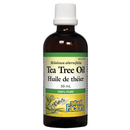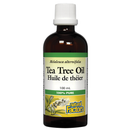Overview
Tea tree oil is amongst the best natural antimicrobial and antiseptic agents available, ideal for relieving minor skin ailments and abrasions. Natural Factors Tea Tree Oil contains high levels of terpinen-4-ol, the main bactericidal compound. It is 100% pure and is safely and gently obtained through steam distillation.
Highlights
- Antibacterial and antiseptic first-aid treatment for minor skin abrasions
- Fights bacteria, fungal infections, parasites, and viruses
- Relieves acne, athlete’s foot, and skin inflammation associated with eczema or dermatitis
- Acts as a natural herbal insect repellant
Advanced Info
Traditionally used by the Aboriginal people of Australia, the leaves of the Tea Tree (Melaleuca alternifolia) plant have been shown to help heal wounds, infections, and a wide range of skin conditions. European settlers learned how to use the tea tree leaves to extract the oil, using it to treat cuts, abrasions, burns, insect bites, and other skin conditions.
Tea tree oil contains over 100 plant chemicals, including terpenin-4-ol, its main active antimicrobial compound. It fights against microbes and bacteria by damaging the cell membrane, disrupting the proteins within them, and rendering them unable to proliferate and cause disease. Tea tree has also shown antiseptic and antifungal activity, and may help against yeast infections as well. Unlike antibiotics, tea tree oil does not contribute to antibiotic resistance.
100% pure tea tree oil is safely and gently obtained through steam distillation and contains no less than 30% terpinen-4-ol for powerful antiseptic and healing action. The convenient small bottle is perfect for packing, whether to the gym, on a hike, or on a longer camping trip for convenient on-the-go first aid.
Nutritional Facts
| Each 1 mL (20 drops) Contains: | |
| Tea Tree Oil (Melaleuca alternifolia) (leaf) (100% pure) | 1 mL |
Suggested Use
Payment & Security
Your payment information is processed securely. We do not store credit card details nor have access to your credit card information.




